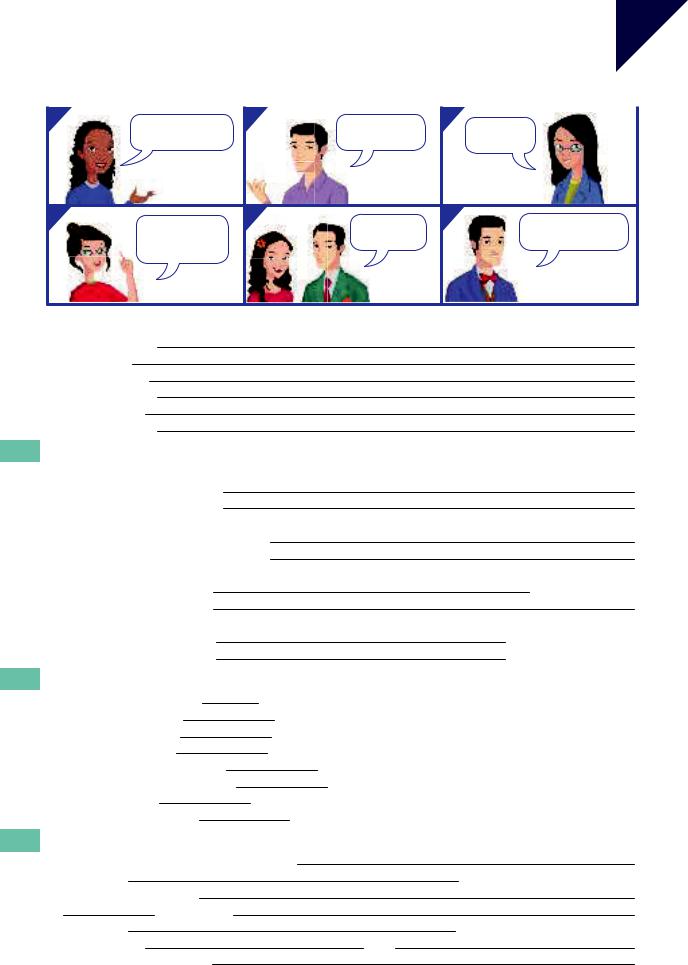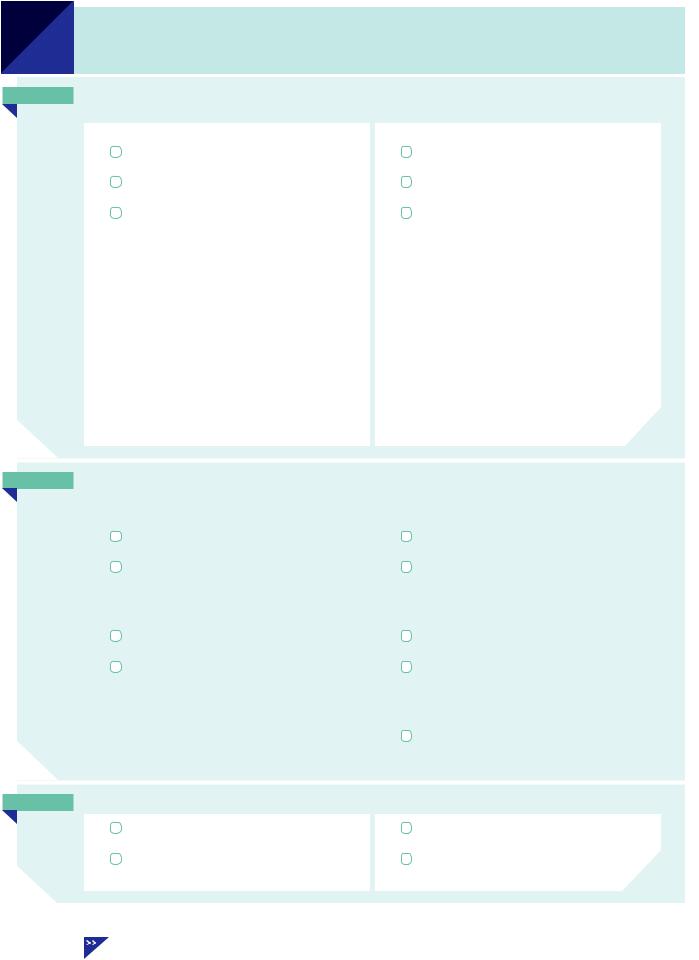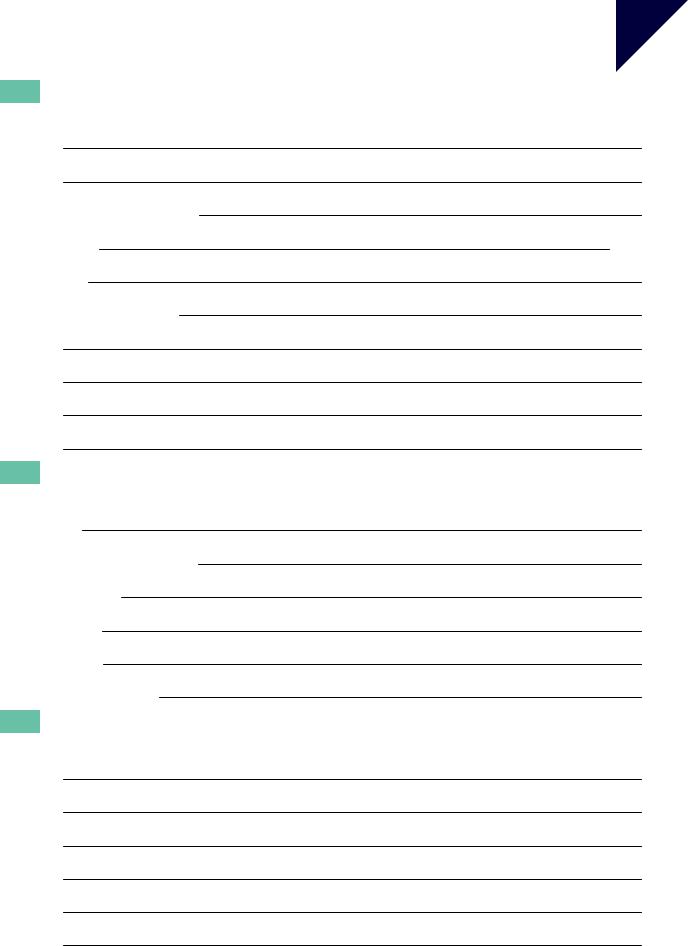
- •Contents
- •Thanks
- •To the student
- •To the teacher
- •3 Present continuous and present simple 1 (I am doing and I do)
- •10 Present perfect continuous and simple (I have been doing and I have done)
- •11 how long have you (been) … ?
- •12 for and since when … ? and how long … ?
- •13 Present perfect and past 1 (I have done and I did)
- •14 Present perfect and past 2 (I have done and I did)
- •15 Past perfect (I had done)
- •16 Past perfect continuous (I had been doing)
- •17 have and have got
- •18 used to (do)
- •19 Present tenses (I am doing / I do) for the future
- •20 I’m going to (do)
- •21 will and shall 1
- •22 will and shall 2
- •23 I will and I’m going to
- •24 will be doing and will have done
- •26 can, could and (be) able to
- •27 could (do) and could have (done)
- •28 must and can’t
- •29 may and might 1
- •30 may and might 2
- •31 have to and must
- •32 must mustn’t needn’t
- •33 should 1
- •34 should 2
- •35 I’d better … it’s time …
- •36 would
- •39 if I knew … I wish I knew …
- •40 if I had known … I wish I had known …
- •41 wish
- •42 Passive 1 (is done / was done)
- •43 Passive 2 (be done / been done / being done)
- •44 Passive 3
- •45 it is said that … he is said to … he is supposed to …
- •46 have something done
- •47 Reported speech 1 (he said that …)
- •48 Reported speech 2
- •49 Questions 1
- •52 Question tags (do you? isn’t it? etc.)
- •53 Verb + -ing (enjoy doing / stop doing etc.)
- •54 Verb + to … (decide to … / forget to … etc.)
- •55 Verb (+ object) + to … (I want you to …)
- •56 Verb + -ing or to … 1 (remember, regret etc.)
- •57 Verb + -ing or to … 2 (try, need, help)
- •58 Verb + -ing or to … 3 (like / would like etc.)
- •59 prefer and would rather
- •60 Preposition (in/for/about etc.) + -ing
- •61 be/get used to … (I’m used to …)
- •63 there’s no point in -ing, it’s worth -ing etc.
- •64 to … , for … and so that …
- •65 Adjective + to …
- •66 to … (afraid to do) and preposition + -ing (afraid of -ing)
- •67 see somebody do and see somebody doing
- •68 -ing clauses (He hurt his knee playing football.)
- •69 Countable and uncountable 1
- •70 Countable and uncountable 2
- •71 Countable nouns with a/an and some
- •74 the 2 (school / the school etc.)
- •75 the 3 (children / the children)
- •77 Names with and without the 1
- •78 Names with and without the 2
- •79 Singular and plural
- •80 Noun + noun (a bus driver / a headache)
- •81 -’s (your sister’s name) and of … (the name of the book)
- •82 myself/yourself/themselves etc.
- •83 a friend of mine my own house on my own / by myself
- •84 there … and it …
- •85 some and any
- •87 much, many, little, few, a lot, plenty
- •90 all every whole
- •91 each and every
- •92 Relative clauses 1: clauses with who/that/which
- •94 Relative clauses 3: whose/whom/where
- •95 Relative clauses 4: extra information clauses (1)
- •96 Relative clauses 5: extra information clauses (2)
- •97 -ing and -ed clauses (the woman talking to Tom, the boy injured in the accident)
- •98 Adjectives ending in -ing and -ed (boring/bored etc.)
- •99 Adjectives: a nice new house, you look tired
- •100 Adjectives and adverbs 1 (quick/quickly)
- •102 so and such
- •104 quite, pretty, rather and fairly
- •105 Comparative 1 (cheaper, more expensive etc.)
- •106 Comparative 2 (much better / any better etc.)
- •107 Comparative 3 (as … as / than)
- •108 Superlative (the longest / the most enjoyable etc.)
- •109 Word order 1: verb + object; place and time
- •110 Word order 2: adverbs with the verb
- •111 still any more yet already
- •112 even
- •114 in case
- •116 as (as I walked … / as I was … etc.)
- •117 like and as
- •119 during for while
- •121 at/on/in (time)
- •122 on time and in time at the end and in the end
- •123 in/at/on (position) 1
- •124 in/at/on (position) 2
- •125 in/at/on (position) 3
- •126 to, at, in and into
- •127 in/on/at (other uses)
- •129 Noun + preposition (reason for, cause of etc.)
- •130 Adjective + preposition 1
- •131 Adjective + preposition 2
- •132 Verb + preposition 1 to and at
- •134 Verb + preposition 3 about and of
- •135 Verb + preposition 4 of/for/from/on
- •136 Verb + preposition 5 in/into/with/to/on
- •137 Phrasal verbs 1 Introduction
- •138 Phrasal verbs 2 in/out
- •139 Phrasal verbs 3 out
- •142 Phrasal verbs 6 up/down
- •143 Phrasal verbs 7 up (1)
- •144 Phrasal verbs 8 up (2)
- •145 Phrasal verbs 9 away/back
- •Additional exercises
- •Study guide
- •Key to Exercises
- •Key to Additional exercises (see page 302)
- •Key to Study guide
- •Index

Unit
94 Relative clauses 3: whose/whom/where
Awhose
Study this example situation:
When we were driving home, we saw some people standing by the road. Their car had broken down, so we stopped to help them.
We helped some people whose car had broken down. (= their car had broken down)
We use whose mostly for people:
A widow is a woman whose husband is dead. (her husband is dead)
I met someone whose brother I went to school with. (I went to school with his/her brother)
Compare who and whose:
I met a man who knows you. (he knows you)
I met a man whose sister knows you. (his sister knows you)
Do not confuse whose and who’s. The pronunciation is the same, but who’s = who is or who has:
I have a friend who’s learning Arabic. (who’s = who is)
I have a friend who’s just started learning Arabic. (who’s = who has) I have a friend whose sister is learning Arabic.
Bwhom
Whom is possible instead of who when it is the object of the verb (see Unit 93B):
George is a person whom I admire very much. (I admire him)
You can also use a preposition + whom (to whom / from whom / with whom etc.):
It’s important to have friends with whom you can relax. (you can relax with them)
Whom is a formal word and we do not oten use it in spoken English. We usually prefer to say:
a person I admire a lot or |
a person who/that I admire a lot |
friends you can relax with |
or friends who/that you can relax with |
Cwhere
We use where in a relative clause to talk about a place:
I recently went back to the town where I grew up. (I grew up there)
The restaurant where we had lunch was near the airport.
I would like to live in a place where there is plenty of sunshine.
Dthe day, the time, the reason …
We say ‘the day we got married’, ‘the year I was born’, ‘the last time they met’ etc. :
I can’t meet you on Friday. That’s the day I’m going away.
The last time I saw her, she looked great.
You can also use that:
The last time that I saw her, she looked great.
We say ‘the reason I’m calling you’, ‘the reason she didn’t get the job’ etc.
The reason I’m calling you is to ask your advice.
You can also use that:
The reason that I’m calling you … or The reason why I’m calling you …
188 |
Relative clauses 1–2 Units 92–93 Relative clauses 4–5 Units 95–96 whom Unit 96 |

Exercises |
|
|
|
Unit |
|||
|
|
|
94 |
||||
|
|
|
|
|
|
|
|
|
|
|
|
|
|
|
|
94.1 |
You met these people at a party: |
|
|
|
|
|
|
|
|
|
|
|
|
|
|
1 |
2 |
My wife is an |
3 |
|
|
||
|
|
My mother writes |
|
I own a |
|||
|
|
detective stories. |
|
English teacher. |
restaurant. |
||
4 |
5 |
|
6 |
|
My ambition is |
We’ve just |
My parents used to |
|
to climb Mount |
got married. |
work in a circus. |
|
Everest. |
|
|
The next day you tell a friend about these people. Complete the sentences using who or whose.
1 |
I met somebody whose mother writes detective stories |
. |
2 |
I met a man |
. |
3 |
I met a woman |
. |
4 |
I met somebody |
. |
5 |
I met a couple |
. |
6 |
I met somebody |
. |
94.2 For each situation write a sentence with whom (more formal) and without whom (less formal).
1 |
You met a friend. You hadn’t seen him for years. |
|
||
|
more formal |
I met a friend |
whom I hadn’t seen for years |
. |
|
less formal |
I met a friend |
I hadn’t seen for years |
. |
2 |
You needed a lawyer. A friend of yours recommended one. |
|
||
|
more formal |
I went to see a lawyer |
. |
|
|
less formal |
I went to see a lawyer |
. |
|
3 |
You called your bank with a problem. You spoke to somebody, but he wasn’t very helpful. |
|||
|
more formal |
The person |
|
wasn’t very helpful. |
|
less formal |
The person |
|
. |
4 |
Tom was in love with a woman, but she wasn’t in love with Tom. |
|
||
|
more formal |
The woman |
|
wasn’t in love with him. |
|
less formal |
The woman |
|
wasn’t in love with him. |
94.3 Complete the sentences using who/whom/whose/where.
1 |
We helped some people whose |
car had broken down. |
2 |
A cemetery is a place |
people are buried. |
3 |
A pacifist is a person |
believes that all wars are wrong. |
4 |
An orphan is a child |
parents are dead. |
5 |
What’s the name of the hotel |
your parents are staying? |
6 |
This school is only for children |
first language is not English. |
7 |
The person from |
I bought my car is a friend of my father’s. |
8 |
I live in a friendly village |
everybody knows everybody else. |
94.4 Use your own ideas to complete these sentences.
1 I can’t meet you on Friday. That’s the day 2 The reason
3 I’ll never forget the time
4 was the year
5 The reason
6 The last time I
7 Do you remember the day
I’m going away
was
.
was that the salary was too low.
.
.
is that neither of them can drive.
.
?
189

Unit
95 Relative clauses 4: extra information clauses (1)
AThere are two types of relative clause. In these examples, the relative clauses are underlined.
Compare:
Type 1
The woman who lives next door to me is a doctor.
Grace works for a company that makes furniture.
We stayed at the hotel (that) you recommended.
In these examples, the relative clauses tell you which person or thing (or what kind of person or thing) the speaker means:
‘The woman who lives next door to me’ tells us which woman.
‘A company that makes furniture’ tells us what kind of company.
‘The hotel (that) you recommended’ tells us which hotel.
We do not use commas (,) with these clauses:  We know a lot of people who live in London.
We know a lot of people who live in London.
Type 2
My brother Ben, who lives in Hong Kong, is an architect.
Anna told me about her new job, which she’s enjoying a lot.
We stayed at the Park Hotel, which a friend of ours recommended.
In these examples, the relative clauses do not tell you which person or thing the speaker means. We already know which thing or person is meant: ‘My brother Ben’, ‘Anna’s new job’ and ‘the Park Hotel’.
The relative clauses in these sentences give us extra information about the person or thing.
We use commas (,) with these clauses:  My brother Ben, who lives in Hong Kong, is an architect.
My brother Ben, who lives in Hong Kong, is an architect.
BIn both types of relative clause we use who for people and which for things. But:
Type 1 |
Type 2 |
You can use that: |
You cannot use that: |
Do you know anyone who/that speaks |
John, who speaks French and Italian, |
French and Italian? |
works as a tour guide. (not that speaks) |
Grace works for a company which/that |
Anna told me about her new job, which |
makes furniture. |
she’s enjoying a lot. |
You can leave out who/which/that when it is |
|
the object (see Unit 93): |
You cannot leave out who or which: |
We stayed at the hotel (that/which) |
We stayed at the Park Hotel, which |
you recommended. |
a friend of ours recommended. |
This morning I met somebody (who/that) |
This morning I met Chris, who I hadn’t |
I hadn’t seen for ages. |
seen for ages. |
We do not oten use whom in this type of |
You can use whom for people (when it is the |
clause (see Unit 94B). |
object): |
|
This morning I met Chris, whom I hadn’t |
|
seen for ages. |
|
|
CIn both types of relative clause you can use whose and where:
We helped some people whose car had broken down.
What’s the name of the place where you went on holiday?
Lisa, whose car had broken down, was in a very bad mood.
Kate has just been to Sweden, where her daughter lives.
190 |
Relative clauses (Type 1) Units 92–94 Relative clauses (Type 2) Unit 96 |

Exercises |
Unit |
95 |
|
|
|
95.1Make one sentence from two. Use the information in brackets to make a relative clause (Type 2). You will need to use who/whom/whose/which/where.
1 Catherine is very friendly. (She lives next door to us.)
Catherine, who lives next door to us, is very friendly.
2 We stayed at the Park Hotel. (A friend of ours recommended this hotel.)
We stayed at the Park Hotel, which a friend of ours recommended.
3We drove to the airport. (The airport was not far from the city.) We drove to the airport,
4 Kate’s husband is an airline pilot. (I have never met Kate’s husband.)
Kate’s pilot. 5 Lisa is away from home a lot. (Lisa’s job involves a lot of travelling.)
Lisa
6Paul and Emily have a daughter, Alice. (Alice has just started school.) Paul and Emily have
7 The new stadium will hold 90,000 spectators. (The stadium will be finished next month.)
8 My brother lives in Alaska. (Alaska is the largest state in the US.)
9 Our teacher was very kind. (I have forgotten her name.)
10We enjoyed our visit to the museum. (We saw a lot of interesting things in the museum.)
95.2Read the information and complete the sentences. Use a relative clause of Type 1 or Type 2. Use commas where necessary.
1 My brother is an architect. (He lives in Hong Kong.)
My
2The strike at the factory has now ended. (The strike began ten days ago.) The strike at the factory
3I was looking for a book this morning. (I’ve found it now.) I’ve found
4I’ve had my car for 15 years. (This car has never broken down.) My car
5A lot of people applied for the job. (Few of them had the necessary qualifications.) Few of
6Amy showed me a picture of her son. (Her son is a police oficer.) Amy showed me
95.3Are these sentences OK? Correct them (and put in commas) where necessary. If the sentence is correct, write ‘OK’.
1 Anna told me about her new job that she’s enjoying very much.
Anna told me about her new job, which she’s enjoying very much.
2 My ofice that is on the second floor is very small.
3 The ofice that I’m using at the moment is very small.
4 Sarah’s father that used to be in the army now works for a TV company.
5 The doctor that examined me couldn’t find anything wrong.
6The sun that is one of millions of stars in the universe provides us with heat and light.
191
